Existing User Log In
New User Registration
Register for a free account to gain full access to the VGChartz Network and join our thriving community.



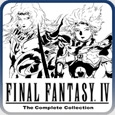

America - Front
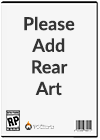

America - Back

There's a reason this has been remade more than any other Final Fantasy.
Final Fantasy IV has the distinction of being the most remade game in the entire Final Fantasy series, and there's a very good set of reasons for that: it's a definitive masterpiece, and it sadly hasn't been played by nearly enough people since it came out before Final Fantasy VII, the game that boosted the Final Fantasy name into the stratosphere. We've seen Final Fantasy IV on the Super Nintendo, original Playstation, Gameboy Advance, the Nintendo DS, and now on the Playstation Portable. There was also a sequel (more like an epilogue) released on the Wii called The After Years. I'm not sure if they're just trying to milk it or if they really want to see this amazing game and the world it inhabits get more exposure for all those who haven't been blessed with its presence. Either way, this remake is more than welcome in my collection, and should be in yours too.
The Complete Collection is rather hard to review since it's a compilation and there's original content, so it's hard to distinguish between what's relevant and who it's relevant to. That said, I'd like to start by saying that if you are one of the unfortunate few who has never played Final Fantasy IV in any of its iterations, this is not only the perfect place to start, but also the only game you'll need to get to enjoy the complete experience, since it's arguably the best of the remakes and is more of an anthology than just a remake. Of course, for the lucky few who have been graced by this game in the past, I still think it's worth picking up, if just to add another play-through of a classic with all the added features and the bonus content.
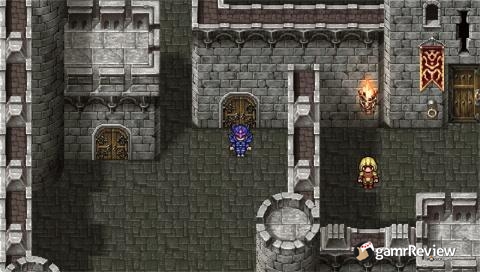
For those new to the world of Final Fantasy IV, the main game is a story of redemption, war, and prophecy. You are Cecil, a dark knight tasked with leading the airship fleet - the Red Wings - around the globe to procure the various crystals of the world for an unknown cause known only to your king. Naturally, since you are the hero, you question your king's motives and end up going your separate ways to find your own version of justice. You're joined by Kain, your best friend/worst enemy, a monk, a spoony bard, various mages and summoners, and even a ninja, all with their own motives and backstories that all revolve around the unifying theme of redemption. You travel all over the globe, and even to different worlds to accomplish your tasks and you undergo many deep and meaningful transformations, suffering many sacrifices along the way. Anything more than that would be a spoiler and that's not what a review is for. Those who have played it know what I'm talking about, the others could do themselves a favour and pick it up to see what all the fuss was about.
To be honest, this is one of the best and most touching stories of any of the Final Fantasy games. It isn't too complicated and doesn't have much in the way of a convoluted history, but it is a very clear and concise story that zips along at a wonderful pace taking you from one event to another with little room in between to breathe. To some it will seem too simplified, especially when many are used to games that have lengthy histories and secrets to learn about. Personally, I felt that its straightforward story pushed you to continue instead of screwing around or going on grinding sessions to level up, instead I was so engrossed in what was going to happen next that I didn't bother powerleveling until it was too late.
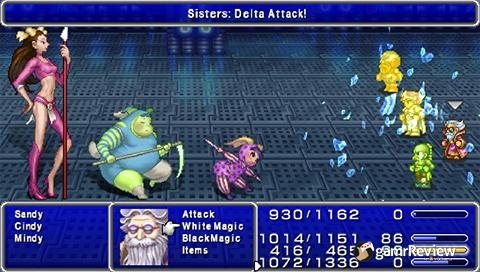
I have to admit, not doing that was a real mistake since this game is hard. It's your basic turn based JRPG, but it's not the kind of game that will have you mindlessly mashing the X button until the battle is over, instead you have to pay close attention to your MP usage, arrow count, HP, and healing items. The basic enemies are all hard enough to whittle your HP down and can take a lot of damage, so strategy is something that you're going to consider if you're going to want to last until the next save point, where I can guarantee you'll use a tent every chance you get. If you're not careful, you will likely die a lot before you even get to said save points, instilling a real sense of dread and fear unlike any previous or subsequent Final Fantasy game.
This is compounded by the fact that the random encounter rate is substantially high, meaning you're likely going to be running from some of the tougher enemies or the ones that take longer to kill. This proved to be a real pain since many of the enemies just weren't worth the time it takes to dispose of them. I admit there were a few times I got really upset that I'd get out of a battle only to be confronted with another battle not three steps later, both of which I'd run from because the experienced gained would not be worth the hassle involved. While the basic enemies are tough and a real test of skill, bosses are thankfully not much more difficult, which helps balance out the difficulty, or this could have ended up being more of a test of your manhood than a traditional game. This was a welcome change compared to what most people are used to, since it stops being a simple numbers game or an endurance marathon and actually becomes about turn based strategy, the combat style the series was modelled around.
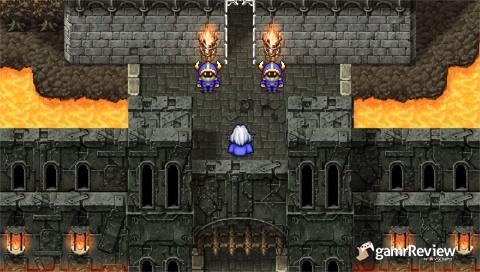
Your reliance on strategy is further compounded by the fact that every single character is unique when it comes to combat, as opposed to the blank-slate characters that you can mould to your will like modern FF games. Instead of having any character be any class or have any move set you wish, Final Fantasy IV forces you to pick and choose your characters based on class, abilities, and stats. Each character has the ability to attack and use an item, but all three of the other command slots go to a unique set of abilities. The monk has the ability to charge up an attack or use a spinning kick that hits all opponents. The summoner can summon and use black magic. The white mage can use white magic or pray to restore all allies HP. I don't need to continue through every character to show my point. You can't just pick the character you think looks the nicest and train him to be a dragoon, you have to pick the dragoon and find a way to work around it. That is strategy, much like a well played chess game, and I wouldn't have it any other way.
In fact, this distinction in characters is amplified by their abilities and behaviour. The coward character actually has an ability called 'hide' that allows him to disappear from the battle in order to preserve his life; the twins have the ability to compound their magic for a devastating combo move; the godly character mastered both white and black magics fully. It's this added level of characterization that really makes each and every one of the members of your party stand out as an individual, and that helps to make you more invested in their plight. It's a surprisingly effective literary tool, one that's not used nearly often enough, and it helps to make that story even more remarkable.
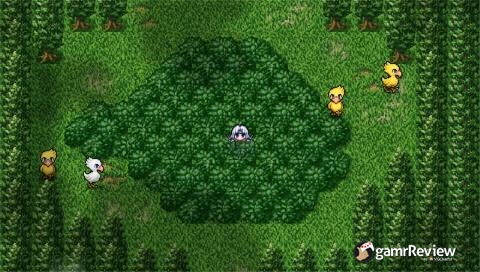
Of course no world building would be complete without the visuals and sound to back it up. Luckily, Final Fantasy IV is an absolutely gem on both fronts. The score is one of the most emotional and haunting of legendary composer Nobuo Uematsu's career; the boss battle theme being the most surreal and nostalgic for me since it also served as Culex's battle theme from Super Mario RPG: Legend of the Seven Stars. But don't think that's all there is to it, the overworld map is as gorgeous as any theme of loneliness and exploration you could hope for, and every other track brings its own unique flair to the scenes they accompany. The game gives you the option to go with the newer, remastered versions of the score or if you're really into keeping the old themes you can chose them instead. It may not sound like a big deal to most, but I've personally never seen another game try something like this and to certain people it'll be a big deal, so I applaud Square Enix for including it as an option.
The perfect compliment to the score is the game's gorgeous visuals. No, there aren't high resolution 3D models or gameplay, instead we get some of the most detailed and beautiful sprites I've ever seen. The character animations may not be particularly special, but there was nary an enemy that didn't look amazing, and there were even a few that made me stare slack-jawed for a moment before realizing I was getting beaten in a battle and I had to pay closer attention to that. It's not the kind of graphics modern gamers tend to want out of a game, but I'd be lying if I said it suffered because of that; I maintain these are some of the best aesthetics I've seen in a game. If there was an award for art direction in videogames, this game would at least be nominated.
If the sprite work wasn't enough to impress me, the magic animations would be. Use Firaga, I challenge you not to grin at the visual marvel on the screen. It's not just a simple fireball that hits the enemies, instead it's a fireball that hovers over the enemy team for a moment, flames shooting out in every direction before crashing into the enemy and causing what looks like the beginnings of a fire-based nuclear explosion. All of it is in stunning detail and is accompanied by very appropriate sound effects that make the damage seem even more substantial. Once you're done with Firaga, try Thundara or Meteor. I dare you to be unimpressed.
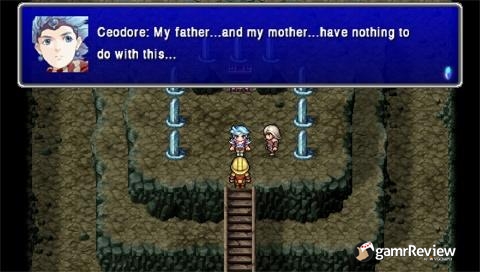
The whole game continued on this path. If I wasn't eagerly frothing at the mouth to find out what happened next, I was getting in yet another random battle just so I could gawk at the magic effects or was exploring the surprisingly well developed world. See, this isn't like Final Fantasy XIII, where there's the very defined path you take with no room for deviation, instead you're given freedom to explore dozens of times throughout the game. The story is plenty linear, but there are also dozens of sidequests and subplots to keep you busy along the way and give you something to do if you've played before. This is where replay value comes into play; if I was going to go through this game a second time (something I most assuredly will as soon as I can), I will be dedicating much of my time to finding all the hidden dungeons, getting the special weapons, and exploring the backstory of certain characters as I could.
Once I'd finished the game, I sat back and thought about all that had transpired, all the options I had and the strategies I'd incorporated and the well developed characters I'd come to love. My first thought was that I wanted to see more of this world, and that's where the compilation aspects come into play. As soon as you're done, you can continue with the all-new adventure: Interlude. This is a very short game meant only to bridge the gap between the original and The After Years. This is also given the visual and audio fidelity afforded to the remake of the original game, so it looks and sounds as good as that, but it doesn't change the fact that the story is mostly inconsequential and forgettable. Had we been given the option to port over our game completion data to the 'sequels', I'd have been more impressed, but as it stands Interlude serves as nothing more than a bridge from one classic to a worthy follow-up.
The After Years, on the other hand, is something to be enjoyed. It's not as epic as the original game, but considering the pedigree it had to follow I don't think anyone was expecting that it would be. This game also received the same graphics and sound that the rest of the package got, so it's a superior version of the WiiWare original if only in presentation. The story, unlike Interlude, is actually pretty good and well done. 17 years have passed since the first game and the moon is reacting oddly with the crystals, so the next generation of heroes has to work together to figure out what's wrong and how to fix it. At various points in the game you're going to be reunited with the entire cast of the first game, so it's like its own wave of nostalgia if you're the kind of person who really wanted to return to the blue planet. As I said, the plot of The After Years pales in comparison to its predecessor, but it's much better than people have been saying and it is about as good as you could hope, plus it adds a lot of new characters and some new gameplay elements that are interesting enough to give it a thumbs up from me.
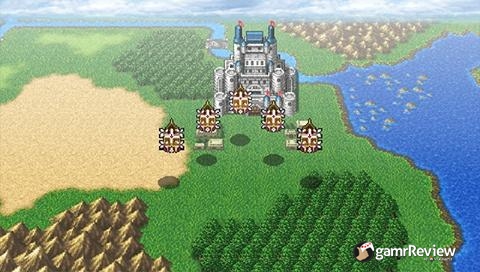
Really, I can't recommend this game more. Since I'd never actually played the original or any of the remakes before this, the entire story was new to me so I got the full effect the developers originally intended. For me, I felt this game would be more than worth the asking price if it was just the remake of the original without the sequels. The game itself was memorable, the story was epic, the characters unique, and the combat refreshingly challenging. That alone may not be worth buying for the fifth time for most people, but even if you've played every iteration of this game to date, there's still The After Years and Interlude to sweeten the deal. It's a lot of bang for your buck no matter how you slice it, so now's the best time to get into the world of Final Fantasy IV if you haven't already.









